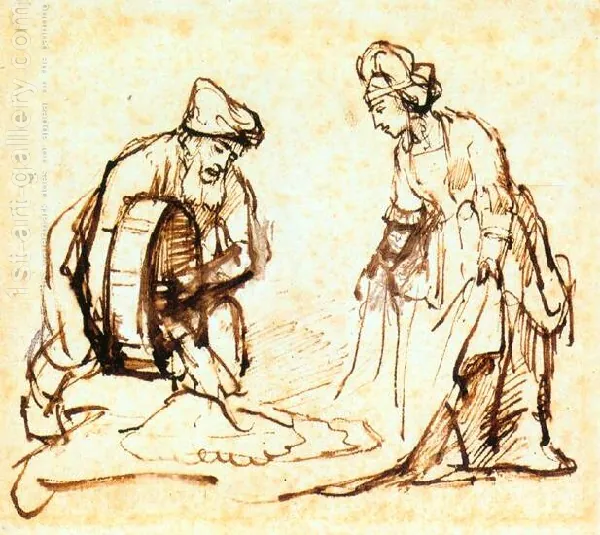
by Phyllis Chesler and Rivka Haut
Once, and for all time, I was privileged to study Torah with Rivka Haut (z”l). At a moment of great loss, I suggested that we study Midrash Ruth Rabbah and so we did. Eventually, towards the end of 2008, we published a small piece about a story that caught our attention. At this time of celebration, I’d like to share it with you all. It appeared in The Jewish Week and we titled it “Pearls out of Paradise.” We wanted our future byline to be:“Devrai Margalit. Read on, you’ll see why.
Midrash Ruth Rabbah [3:4] contains a story about a second-century rabbi’s wife who taught Rebbe — Yehudah HaNasi, redactor of the Mishna — a profound lesson about tzedakah.
Our story takes place in Tiberius, on the eve of a chag (festival). Rabbi Shimon Bar Halafta, absorbed in his Torah study, has no money to buy food. Told that all employers have just paid their workers, he goes to a grotto and prays to his “Employer” for his wages. Lo, a hand emerges from Heaven and offers him a magnificent pearl. Shimon immediately brings it to his colleague, Rebbe, an extremely wealthy man, who tells him the jewel is priceless. Rebbe advises him to wait until after the chag, when they can sell it in the marketplace. In the interim, Rebbe lends Shimon money to buy food.
Shimon arrives home with an abundance of food. When he tells his astonished wife where the food came from, she is dismayed and explains that the pearl comes from the canopy that he will sit under in Paradise. Not wanting his canopy to be missing a pearl, she tells her husband he must return the food, the money, and the pearl. Shimon follows her advice and miraculously, the heavenly hand re-appears and retrieves the jewel.
Angrily, Rebbe summons her and chastises her for causing pain to so holy a man. Rebbe says, “I will give him one of the pearls from my own canopy in Paradise.”
She rejects his offer: “Don’t you know Resh Lakish’s position on this?” She reminds Rebbe that we each earn our heavenly pearls by our deeds in this world. In Paradise, we can no longer give tzedakah. Rebbe’s professed munificence in the next world was useless to a hungry pair. Rebbe agrees that she advised her husband correctly.
One might view Shimon’s unnamed wife as mainly concerned with her husband’s honor and with her own reflected glory in Paradise. However, we believe that she was more interested in this life than in the next one. According to this Midrash, Rebbe did not freely offer Shimon food or a loan. Only when Heaven intervened, and with the pearl as pledge, did Rebbe offer a loan. Rebbe’s generosity was confined to the afterlife. However, according to this wise woman, we are supposed to help people in need in this world, tzedakah cannot be delayed.
Since Shimon’s wife is unnamed, we would like to name her “Margalit,” pearl. Was Reb Margalit a good teacher? Later in Midrash Ruth Rabbah [5:7], (perhaps chronologically later as well), we learn that Rebbe used to drop parched corn while walking along the very path that he knew Shimon would take. This suggests that Rebbe had found a way to give Shimon tzedakah anonymously, without causing Shimon embarrassment.
Rebbe had another lesson to learn about tzedakah. In Baba Batra [8a] we’re told that in a year of drought, Rebbe opened his storehouses but only for the learned. One scholar entered but, when drilled by Rebbe as to his scholarship, responded that he was unlearned. Rebbe said: How can I then support you? The man replied: “Support me as you would a dog, as a raven,” whom God supports.
Rebbe gave food to the man but sadly, since he believed that the unlearned brought destruction to the world. However, Rebbe’s students informed their teacher that this man, Rabbi Yonatan Ben-Amram, was actually Rebbe’s own student and certainly a scholar. He denied being a scholar because he refused to use his Torah knowledge for earthly gain.
After that, Rebbe opened his storehouses to everyone. We see that even a great scholar like Rebbe still had something to learn from one of his students and from a poor scholar’s wife. Perhaps what made him great was his capacity to learn from everyone. This year, let us learn from Reb Margalit and Reb Yonatan to celebrate God’s bounty by sharing sustenance with others without delay.
And, as Nechi Sirota once pointed out, Ruth fed Naomi, perhaps as a tikkun for her people, the Moabites, who had refused to meet our people with food and water when we were wandering in the desert.
Shabbat Shalom v’ chag Sameach.
- Like
- Digg
- Del
- Tumblr
- VKontakte
- Buffer
- Love This
- Odnoklassniki
- Meneame
- Blogger
- Amazon
- Yahoo Mail
- Gmail
- AOL
- Newsvine
- HackerNews
- Evernote
- MySpace
- Mail.ru
- Viadeo
- Line
- Comments
- Yummly
- SMS
- Viber
- Telegram
- Subscribe
- Skype
- Facebook Messenger
- Kakao
- LiveJournal
- Yammer
- Edgar
- Fintel
- Mix
- Instapaper
- Copy Link






